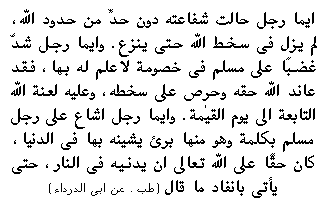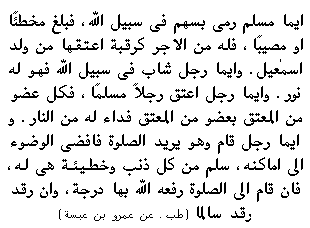Prof. Dr. Mahmud Es'ad COSAN
AKRA FM Friday Discourse
July 7, 2000
ENMITY TOWARDS A MUSLIM
As-salaamu alaikum wa rahmatullahi wa barakatuh!
Dear Brothers and Sisters,
May Allah's peace, mercy and bounty be with you. May your Friday be blessed. May Allah let you enjoy the beauties, blessings, mercy, grace, and rewards of Friday.
a. Interfering with Punishment by Sharia
The first hadith in our discourse today was narrated by Abud-Derdâ RA and included in the collections of Tabarânî. Our beloved Prophet said:

RA 181/9 (Ayyumâ rajulin hàlet shafâatuhû dûna haddin min hudûdillâh, lam yazal fî sakhatillâhi hattâ yenzi'a. Wa ayyumâ rajulin shadda ghadaban alâ muslimin fî khusmatin lâ ilma lahû bihâ, faqad ànadallàha haqqahû wa harisa alâ sahatihî, wa alayhi la'natullahit-tâbi'ati ilâ yawmil-qiyâmah. Wa ayyumâ rajulin ashâ'a alâ rajulin muslimin bikalimatin wa huwa minhâ barî'un yashînuhu bihâ fid-dunyâ, kâna haqqan alallàhi taàlâ an yudniyahu fin-nâri hattâ ya'tiya biinfâdin mâ qàl.)
The first part of the hadith is about interfering with a punishment which is in accordance with Sharia: (Ayyumâ rajulin hàlet shafâatuhû dûna haddin min hudûdillâh, lam yazal fî sakhatillâhi hattâ yenzi'a.) "If a person interferes or prevents the punishment which is prescribed by Allah, he incurs the wrath of Allah until he withdraws his interference or prevention."
Mankind has to live by the rules and laws. Some of the rules and laws are prescribed by Allah in the Qur'an through the Prophet. These are religious rules or canonical laws. These rules are to be obeyed. There are also laws made by the society. These laws, too, are to be obeyed. If one disobeys a law, he incurs a punishment or deprivation of certain rights.
If a religious law requires a punishment, and a person of status or wealth interferes saying, "Overlook this law and do not apply this punishment to this person, please!" then he will commit an offense: Allah will get angry at the person who interferes so long as he insists on the interference. Of course it is important to observe the rights and rules. If it is a law prescribed by Allah, then it has additional importance.
The society makes some laws. From the primitive societies to the most advanced ones, each society has its own set of rules. These rules may differ from one society to another because they are made by people. The laws made by people may be unjust. A state may be ruled by laws; however, this does not guarantee that the state is a just state. The laws may violate certain universal rights that each person has. The law-makers are a group of people with limited knowledge on issues. It is possible for them to make mistakes. Sometimes some rights are violated intentionally by the man-made laws.
When there is a violation of a law, there will be a punishment. The punishment has to be in proportion with the violation. The seriousness of the violation is something hard to evaluate without taking sides.
Man-made laws may be fair or unfair; however, the laws prescribed by Allah are always fair even if we fail to see the wisdom behind them. The prescribed penalties are called hudûd-u Shar'iyya. Interference with such a penalty is not acceptable, for Allah gets angry at the person who wants to be an arbitrator in lessening or waving the penalty. The person is subject to the wrath of Allah until he submits himself to the order of Allah.
The lesson we draw from this part of the hadith is that we shall not interfere or intercede while the orders of Allah are carried out.
b. Enmity Towards a Muslim
The prophet continued: (Wa ayyumâ rajulin) "Imagine a person (shadda ghadaban alâ muslimin) who increased his anger towards a Muslim (fî khusmatin) in enmity or a disagreement (lâ ilma lahû bihâ) without a detailed knowledge about the matter. (Faqad ànadallàha haqqahû) His enmity and stubbornness are towards Allah." This is a terrible state.
Lacking the detailed knowledge and yet getting angry at a Muslim, (wa harisa alâ sahatihî) "this person would be asking for the wrath of Allah. (Wa alayhi la'natullahit-tâbi'ati ilâ yawmil-qiyâmah) The curse of Allah will be with him until the Day of Resurrection."
A person must not have enmity towards a Muslim on matters he does not have sufficient information. We often observe such cases in our social activities. Some people criticize and gossip about some Muslims. If they come and ask or investigate the matter, they will see that the truth is not how they thought it were.
Here is the last part of the hadith: (Wa ayyumâ rajulin) "Imagine a person (ashâ'a alâ rajulin muslimin bikalimatin wa huwa minhâ barî'un) who is spreading false information about a Muslim (yashînuhu bihâ fid-dunyâ) in order to tarnish the image of the Muslim in this world. (Kâna haqqan alallàhi taàlâ) It becomes an obligation on Allah (an yudniyahu fin-nâri) to bring the person closer to the hellfire (hattâ ya'tiya biinfâdin mâ qàl) until he confesses that his words were baseless and false."
There are three lessons to be drawn from this hadith:
1. It is not proper to request the waiver for a punishment which is prescribed by Allah. The person has to suffer the consequences of his misconduct. One should not have mercy on thieves, bandits or bribe-seekers. Forgiveness for them leads the society towards a total corruption. While the honest ones would suffer, the crooks would rule the society.
2. Without the detailed knowledge on an issue, a person should not get angry at a Muslim. It is possible that the Muslim may be innocent and does not deserve such an anger.
3. We should not spread false information about a Muslim to discredit him or to tarnish his image. It is false accusation, so it takes the person to hellfire.
These are very important lessons. The hadith indicates seriousness of Islam on matters related to the society and the rights of individuals. Hundreds of years ago, our beloved Prophet stated these universal rules and raised a nation respectful for these rights. He fulfilled his mission perfectly.
c. Jihad For the Sake of Allah
The second hadith:

RA. 182/2 (Ayyumâ muslimin ramâ bisahmin fî sabîlillâh, febelegha muhti-an aw musîban, falahû minal-ajri karaqabatin a'takahâ min wuldi ismâîl. Wa ayyumâ rajulin shâba fî sabîlillâhi fahuwa lahû nûrun. Wa ayyumâ rajulin a'taqa rajulan musliman, fakullu 'udwin minal-mu'taqi bi'udwin minal-mu'tiqi fidâun lahû minan-nâr. Wa ayyumâ rajulin qàma wa huwa yurîdus-salâta fa-afdal-wuda ilâ amâkinihî, salima min kulli dhenbin wa khatîetin hiya lahû, fa-in qàma ilas-salâti rafa'ahullàhu bihâ darajatan, wa in raqada raqada sâlimâ.)
This hadith also has good news. Prophet SAS said: (Ayyumâ muslimin ramâ bisahmin fî sabîlillâh) "If a Muslim shoots an arrow in a war for the sake of Allah, (febelegha muhti-an aw musîban) whether it reaches the target or not, (falahû minal-ajri karaqabatin a'takahâ min wuldi ismâîl) Allah rewards this Muslim as if he freed one of the noble children of Ismail AS from slavery."
Here min wuldi ismâîl means "children of Ismail AS." The phrase can also be pronounced as min waladi ismâìl. Ismâil AS, the son of prophet Ibrahim AS, is the most respected ancestor of Arabs. If a slave is from his family, then the price to free him from slavery would be very high. This means that shooting an arrow would be so rewarded in the hereafter so much. This indicates the importance of fighting for the sake of Allah.
During the time of the Prophet SAS, arrows, spears and swords were the main weapons. Now, there are more advance weapons: bullets, cannons, missiles and others. Using them now would get the same reward. Allah knows best of course.
(Wa ayyumâ rajulin shâba fî sabîlillâhi) "If a Muslim spend all his life to do jihad for the sake of Allah and if his hair and beard turns gray meanwhile, (fahuwa lahû nûrun) his old age is a valuable light for him. He is a beloved servant of Allah."
(Wa ayyumâ rajulin a'taqa rajulan musliman) "If a person frees a Muslim slave, (fakullu 'udwin minal-mu'taqi bi'udwin minal-mu'tiqi) for each organ of this slave, (fidâun lahû minan-nâr) his organs would be freed from the hellfire. In other words, the one who frees a slave does not enter hellfire."
(Wa ayyumâ rajulin qàma wa huwa yurîdus-salâh) "If a Muslim gets up with the intention to pray; (fa-afdal-wuda ilâ amâkinihî) and he makes wudu in a proper manner, i.e., he washes his hands, face, arms and feet and wipes his head and neck well; (salima min kulli dhenbin wa khatîetin hiya lahû) he will be cleansed from all sins he had committed. (fa-in qàma ilas-salâh) If he prays after wudu, (rafa'ahullàhu bihâ darajatan) Allah increases his degree."
His sins were already cleaned due to wudu. What is left after getting rid of sins is the increase in the degree, the spiritual level, the rank in paradise. So, due to salat, his degree is increased.
(Wa in raqada) "If he goes to sleep after that, (raqada sâliman) he will sleep in peace."
It is very beautiful, May Allah make us, our children, our spouses, our loved ones persistent on our Islamic duties. May Allah make us people who are persistent on prayers and fasting.
Of course jihad and aging in jihad are very important in Islam. Having gray hair is a sign of old age. Some people color their hair or pluck the gray ones to hide their old age. In a hadith Prophet SAS said:

RA. 182/7 (Ayyumâ rajulin natafa sha'ratan baydà-an mu'tamidan sàrat rumhan yawmal-qiyâmati yut'anu bihî.) [If a person would plucks his gray hair to hide his old age, these hair would become spears against him on the Day of Judgment.] So one should not pluck his gray hair. We see around us many nice brothers with beautiful gray, almost silk-white, beard. Carrying out obligations and spending time in voluntary prayers and dhikr, their faces become bright and illuminated. May Allah make us grow older in jihad and in other worship.
d. Gentleness of the Rulers
The next hadith was narrated by Hadrat Aisha:

RA 182/5 (Ayyumâ wâlin waliya felâna wa rafaka rafakallàhu bihî yavmal-kıyâmah)
Our beloved Prophet SAS said: (Ayyumâ wâlin) "If a governor or a ruler (waliya) was appointed to rule..." Here, the ruler is not limited to the governor; it could be any administrator at any level of the government. It refers to any person who assumes the responsibility to carry out a duty. (felâna wa rafaka) ".. and if he treats people gently and nicely, (rafakallàhu bihî yavmal-kıyâmah) on the Day of Judgment Allah treats him gently and nicely." Allah rewards him in the hereafter.
May Allah give us the opportunity to treat people nicely and gently. May Allah give us such rulers and administrators. May Allah be pleased with you all.
As-slaamu alaikum wa rahmatullahi wa barakatuh.
July 7, 2000 -- AUSTRALIA